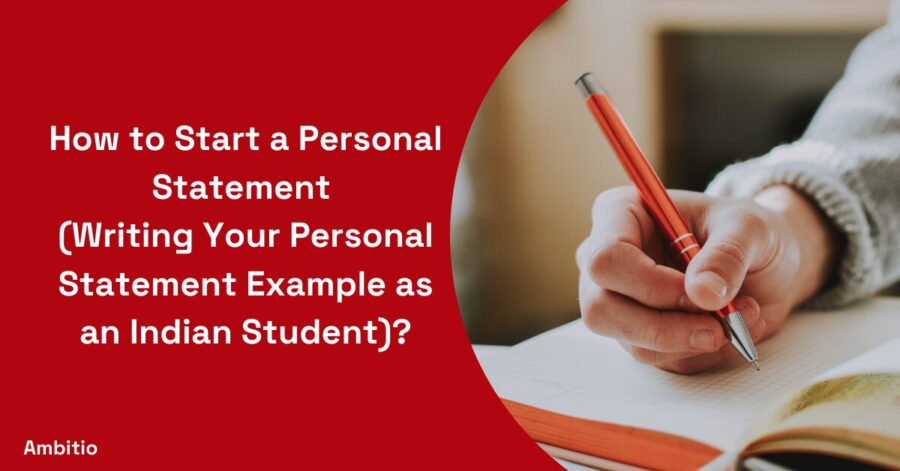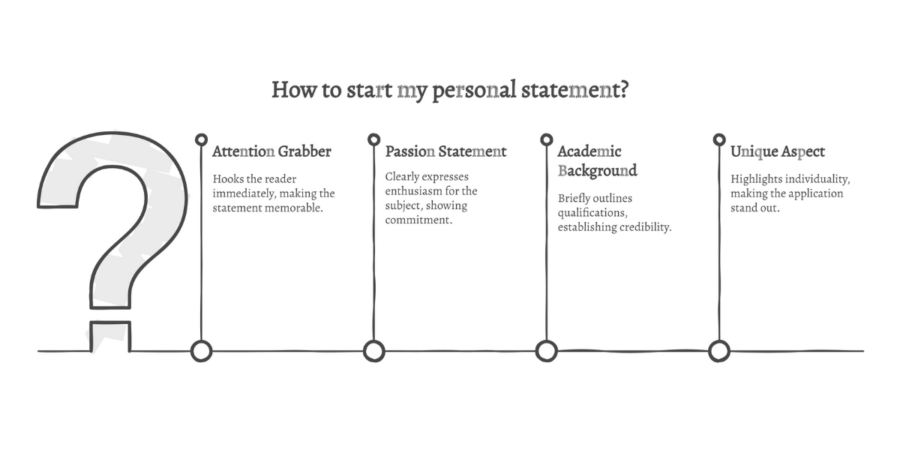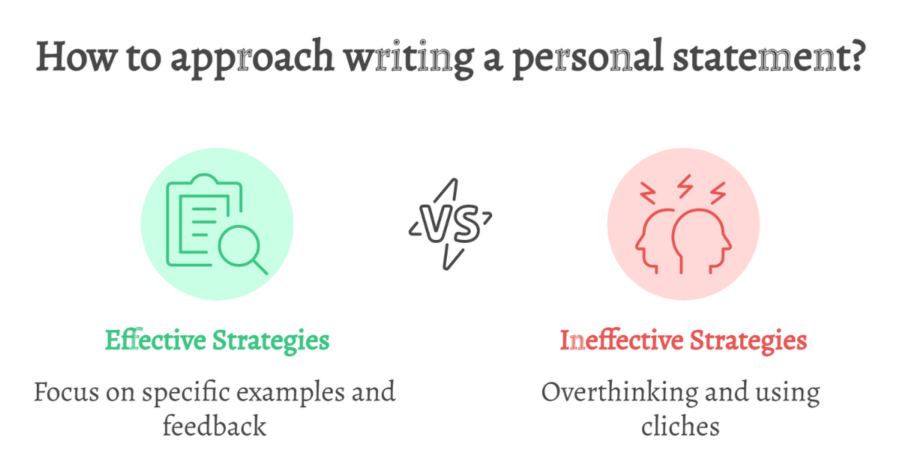7 May 2025
5 minutes read
How to Start a Personal Statement (Writing Your Personal Statement Example as an Indian Student)?

Key Takeaways
- How to start a personal statement: Begin with a clear purpose and an engaging hook to captivate the admissions committee from the very first line.
- How to start a personal statement: Use specific examples and avoid clichés to reflect your unique academic interests and future goals.
- How to start a personal statement: Highlight your passion for the subject and tailor your opening to align with the chosen course or program.
If you’re staring at a blank page and wondering how to start a personal statement, you’re not alone. Every Indian student applying abroad asks the same question. A personal statement is your opportunity to stand out from the crowd and create a positive impression. Instead of overthinking the opening, aim to be straight to the point.
Engage the reader with an attention grabber that gives them time to think about you beyond grades. This article breaks it all down—from writing your statement to exploring statement examples that will guide you. It’s your chance to share who you are.
What is a Postgraduate and Undergraduate Personal Statement and What is its Writing Process?
A personal statement for college varies slightly depending on whether it’s for an undergraduate degree or postgraduate course. UG personal statements often lean toward your academic background and future career goals, while postgraduate ones go into more detail about your skills and knowledge. In both cases, the college application process demands a strong writing approach.

Write your statement keeping in mind that the admissions team wants to see your enthusiasm for the subject and interest in the subject. Avoid cliches and focus on what you truly want to achieve. Think of it as an opportunity to talk about aspects of your life not captured in grades or scores.
How to Write Your Personal Statement for Uni Admission?
Fun fact: Most students spend more time picking the topic of your essay than writing the actual content! But the secret lies in knowing how to write a good personal statement.
Here are some tips to write a standout personal statement:
- Start early to give yourself time for several drafts.
- Do not overthink the opening of your statement.
- Use specific examples to explain your academic interests and voluntary work.
- Avoid cliches and tailor each personal statement for college to the chosen course.
- Get feedback from a trusted friend or mentor.
- Check the application for word count limits and program expectations.
How to Start Writing a Great Personal Statement?
Fun fact: The opening lines of your personal statement can either make or break your application.
Here are some tips that can give your application process a head start:
- Hook the reader with an attention grabber.
- Explain your passion for the subject in one or two clear lines.
- State your academic background briefly.
- Mention a unique aspect of your life or experience.
- Write your first draft without worrying too much—just get started!
| Element | Undergraduate Personal Statement | Postgraduate Personal Statement |
|---|---|---|
| Focus | Academic interests, future goals | Skills and knowledge, career experience |
| Word Count | Around 4000 characters | Varies, usually 500-1000 words |
| Experience Mentioned | School achievements, voluntary work | Work experience, research involvement |
| Writing Style | Conversational but formal | More focused and concise |
| Target Audience | Admissions committee | Selection committees |
What are Some Things to Be Included While Writing a Good Personal Statement (Work Experience and Writing Skills)?
Fun fact: Personal statements often reflect more about your writing skills than you realize!

Do not forget to include the below things in your statement:
- Highlight relevant work experience to show you understand the field.
- Mention any voluntary work to support your academic goals.
- Use factual information to demonstrate your credibility.
- Show enthusiasm for the subject without sounding forced.
- Use strong writing and specific examples to support your claims.
How to End Your Personal Statement for Postgraduate and Undergraduate Programs?
Fun fact: A great ending gives the admissions committee one last reason to pick you!
Here are some ways to conclude your essay:
- Summarize your academic interests and chosen course.
- Reaffirm your future career goals.
- End with a statement that shows your passion for the subject.
- Tie back to your opening lines if possible.
- End confidently, showing why you’re ready for this opportunity.
Personal Statement Example for University Admission for a Smooth Application Process
Given below is a sample personal statement to help you write your own.
This personal statement provides a glimpse into how one can write a good college essay that connects every part of the college application effectively. Use this as a model while writing your statement.
My name is Aarav Mehta, and I want to study Computer Science at the University of Manchester. Ever since I built my first website at 14, I have been fascinated by how digital platforms work. During high school, I participated in hackathons and worked as a volunteer tech assistant in my local NGO.
These experiences taught me how to apply coding skills to solve real problems. My undergraduate degree will not only help me deepen my academic interests but also prepare me for a future career in software development. My coursework in mathematics and computer applications, along with a TOEFL score of 113, supports my readiness for this course.
I believe my set of skills, combined with a strong academic background and enthusiasm for the subject, makes me a great fit. I am eager to contribute to the university’s coding societies while developing as a globally competent tech leader.
Top 10 Universities Recommended by Admission Tutors Where Writing a Personal Statement Matters
Did you know that some of the most prestigious universities place a lot of weight on your personal statement and take it seriously during the course application?
Here are some prestigious institutions where your personal statement actually makes an impact:
| Sl. No. | Country | University | Fee (USD) | Personal Statement Requirements | Programs Offered |
| 1 | USA | Harvard University | $55,000/year | Required for most courses | Law, Medicine, Engineering |
| 2 | UK | University of Oxford | £27,840/year | Compulsory, course-specific | PPE, Law, Literature |
| 3 | USA | Stanford University | $56,169/year | Strong emphasis for humanities | AI, Psychology, Literature |
| 4 | UK | University of Cambridge | £28,401/year | Highly valued by tutors | Natural Sciences, Law |
| 5 | USA | Yale University | $59,950/year | Detailed personal statement required | Political Science, History |
| 6 | UK | Imperial College London | £26,000/year | Technical focus, specific examples required | Engineering, Medicine |
| 7 | USA | MIT | $53,790/year | Essay-based, showcases strong writing | Engineering, Computer Science |
| 8 | UK | University of Edinburgh | £20,950/year | Moderately important | History, Philosophy |
| 9 | USA | University of Chicago | $60,552/year | Known for quirky essay prompts | Economics, Political Science |
| 10 | UK | London School of Economics | £22,430/year | Strong focus on analytical writing | Economics, Social Sciences |
Conclusion
Starting early with your personal statement and understanding its structure is key to crafting a winning application. Whether you’re applying for an undergraduate degree or a postgraduate course, the personal statement is a chance to share your journey. Avoid cliches, go straight to the point, and use specific examples that reflect your skills and enthusiasm for the subject.
Check the application for word count and program specifics, and remember to write several drafts. Your college essay reflects not just your academic background but your personality. From the opening lines to the closing paragraph, engage the reader with honesty and flair.
Use AI tools cautiously, and always get feedback from a trusted friend before submission. Let your personal statement stand as a true reflection of who you are and what you want to achieve. For expert guidance, choose Ambitio!
FAQs
How to start a personal statement if I have no experience?
If you’re wondering how to start a personal statement without prior experience, focus on your passion for learning, your academic interests, or a moment that inspired your chosen course.
How to start a personal statement for college application essays?
To understand how to start a personal statement for a college application, begin with a personal story or insight that reflects your enthusiasm for the subject and future career goals.
How to start a personal statement without sounding like a cliché?
The key to how to start a personal statement without clichés lies in being authentic—use a unique experience or perspective rather than popular quotes or overused phrases.
How to start a personal statement with a quote or question?
If you’re exploring how to start a personal statement using a quote or question, ensure it directly ties into your personal journey, academic background, or passion for the subject.
How to start a personal statement for postgraduate admissions?
When learning how to start a personal statement for postgraduate study, start with a reflection on your academic growth and what you want to achieve through the course.
How to start a personal statement to make it stand out?
The secret behind how to start a personal statement that stands out is using a powerful anecdote, showcasing your skills and knowledge while engaging the reader from the beginning.
How to start a personal statement if English is not your first language?
Understanding how to start a personal statement as a non-native speaker means focusing on clarity, honesty, and demonstrating your enthusiasm for the subject using simple, impactful language.

You can study at top universities worldwide!
Get expert tips and tricks to get into top universities with a free expert session.
Book Your Free 30-Minute Session Now! Book a call now




























